Have just been reading the contributions to date (with Ian’s gentle prodding!!) and feel somewhat tentative / nervous of wading in, given that I am not a ‘food geographer’ but rather have been working around the broad area of domestic sustainable consumption for a number of years trying to bring human geography / environmental politics into conversation. However…one thought that did spring to mind relates to some work I did a couple of years ago. I was involved with the Australian Conservation Foundation (big national NGO) who implemented a GreenHomes programme, which was a series of voluntary workshops where people from specific Sydney neighbourhoods could turn up for an evening once a month and learn about the energy efficiency / composting / ’green’ household products. This kind of public education / participation approach may seem pretty old hat in but there really hadn’t been much like it going on at this level in Australian (i.e. well-funded, coherent structure and programming).
Talking with GreenHome participants during and after the programme, I wanted to know (amongst other things) how finding out more about where and how their cleaning products, utilities etc came from / were made altered their perceptions of the implications and impacts of their everyday practices i.e. did the socio-technical relations of the home (see Shove; Kakia refs below for more insight on this term) that remain hidden in the pipes and wires and switches of our homes now seem more transparent / alive etc; and if so, did this have any impact on their understanding of the politics of their own consumption practices?
Well, it did but not in a way I was quite expecting…and this relates to Julie’s previous points about the unveiling of the commodity fetish and the possibility / probability that Fair Trade is a mirror rather than a window, as I think that applies to what was going on in terms of GreenHome participants. That is, many expressed feelings of being confused / overwhelmed / un-interested in trying to understand how, for example, ‘green’ electricity is different from ordinary electricity / where it comes from; how it gets to them etc. So instead of wanting the vast social and environmental relations and impacts of their behaviours to become more transparent, participants seemed to want more ‘stuff’ to compensate for the fact that the stuff they already have / the things they already do are now deemed unsustainable i.e. that their ‘stuff’ was behaving badly and had to be disciplined through new practices. So, this wasn’t about living more simply or learning about the socio-political relations enrolled into everyday things and services, but about getting objects such as shower timers, compost bins and re-usable shopping bags that did the work for them i.e. altered these relations without the users having to think about it. Hence, the mirror analogy – some participants saying that when they see their shower timer / compost bin etc, it reminds them that they are at least trying to make a difference without having to hold what that difference might be in their minds and actions every day (I have put all this much more coherently in the 2006 paper cited below).
I am not saying there is a direct relationship between food and shower timers, as they have their own temporalities, meanings and movements. But rather that the implicit urge to simplify the already complex socio-material relations we may intuitively know we are already a part of appears to be driving the reactions of GreenHome participants at least. In the same way that the some of the blog postings have talked about a ‘re-coupling’ of producers and consumers, I think the same can be said (but to a lesser degree) for those household getting involved in energy micro-generation schemes etc…or at least I am thinking it might, and this is an area I would love to do some research into if only there were 3 of me instead of 1!!
References
Hobson, K. (2006). "Bins, bulbs and shower timers: on the 'techno-ethics' of sustainable living,." Ethics, Place and Environment 9(3): 335-354.
Kaika, M. (2004). "Interrogating the Geographies of the familiar: Domesticating nature and constructing the autonomy of the modern home." International Journal of Urban and Regional Research 28(2): 265-86.
Shove, E. (2003). Comfort, Cleanliness and Convenience: The Social Organization of Normality. Oxford, Berg.
Monday, August 18, 2008
Subscribe to:
Post Comments (Atom)

No comments:
Post a Comment